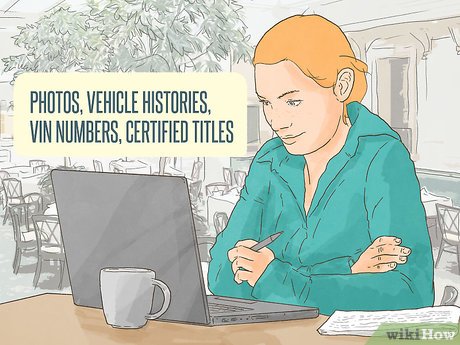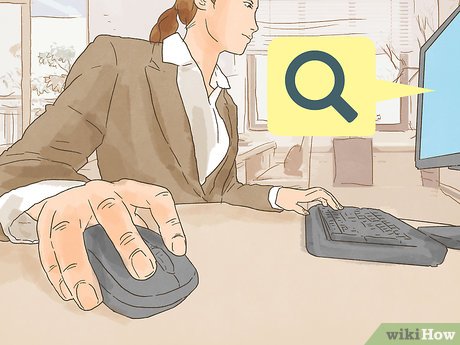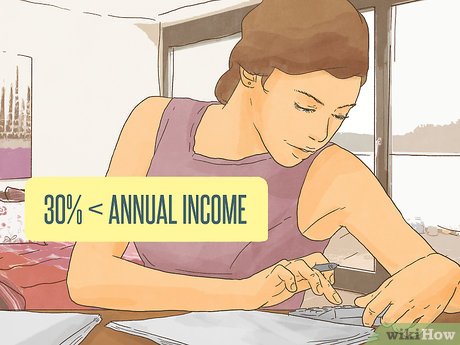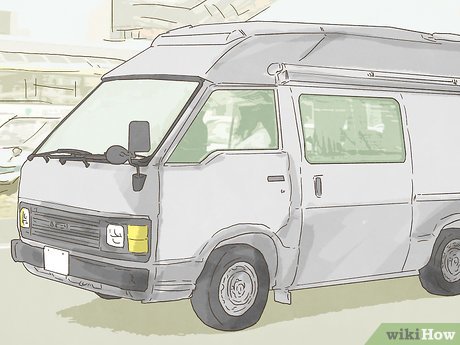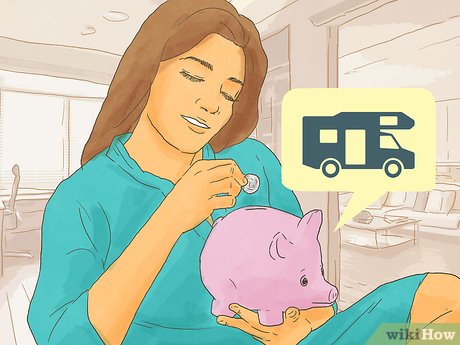How to Live in an RV
Part 1 of 3:
Part One: Making the Decision
-
 Evaluate your reasons. Living in an RV can be very different from living in a conventional home, so to make the experience a success, you need to make sure that you have a good reason to stay committed to it. There are no definite 'right' or 'wrong' reasons, though, so a reason that seems solid to you will usually be enough.
Evaluate your reasons. Living in an RV can be very different from living in a conventional home, so to make the experience a success, you need to make sure that you have a good reason to stay committed to it. There are no definite 'right' or 'wrong' reasons, though, so a reason that seems solid to you will usually be enough.- Retirees and individuals who frequently relocate due to their jobs are among those who usually choose to live in an RV full-time. That being said, if you want to live a simpler life or long to travel across country, this can be a good life choice for you, too.
-
 Get a consensus. Even though living in an RV evokes a sense of freedom, the truth of the matter is that you'll be living in very close quarters with your family members and spending many, many hours with them. If anyone opposes the lifestyle, the divide will create unwanted and inescapable tension in your everyday life.
Get a consensus. Even though living in an RV evokes a sense of freedom, the truth of the matter is that you'll be living in very close quarters with your family members and spending many, many hours with them. If anyone opposes the lifestyle, the divide will create unwanted and inescapable tension in your everyday life.- If you have kids under the age of 18, make sure that your kids agree to the idea along with your spouse. The entire family should also prepare to undertake the challenge of homeschooling.
-
 Practice before committing. If you've never spent a prolonged period of time in an RV, it's a good idea to try before you buy. Rent or borrow and RV and try vacationing in it for one week to one month. Doing so should give you a better idea of what long-term RV life might be like.[1]
Practice before committing. If you've never spent a prolonged period of time in an RV, it's a good idea to try before you buy. Rent or borrow and RV and try vacationing in it for one week to one month. Doing so should give you a better idea of what long-term RV life might be like.[1]- Even if you have experience driving or hauling large trailers, you need to have the experience of actually living in an RV. Get a good idea of what it's like to drive the vehicle, organize and schedule your drives, budget for life on the road, and live day-to-day with only the necessities.
-
 Learn about licensing laws. In many cases, you won't need a special driver's license to drive or haul an RV, but there are some exceptions. Research the licensing laws in the state of your permanent address and fulfill those requirements before you make any other preparations.
Learn about licensing laws. In many cases, you won't need a special driver's license to drive or haul an RV, but there are some exceptions. Research the licensing laws in the state of your permanent address and fulfill those requirements before you make any other preparations.- Check with the state DMV to determine the legal requirements. Some notably large motorhomes may require you to obtain a different license for a different vehicle class, but you shouldn't need a commercial driver's license since an RV is a personal vehicle.
-
 Prepare a backup plan. Life is unpredictable, and there are numerous things that could go wrong and prevent you from continuing RV life for prolonged periods of time. Have an alternate way of living planned out in case of an emergency.[2]
Prepare a backup plan. Life is unpredictable, and there are numerous things that could go wrong and prevent you from continuing RV life for prolonged periods of time. Have an alternate way of living planned out in case of an emergency.[2]- If your RV breaks down or if you develop medical problems that prevent you from traveling, you will need to figure out where to stay and how to pay for the associated costs.
- Make sure that you have adequate insurance for your RV and for your own health.
- Try to keep a savings account that will allow you to live for one full year without your RV.
- If possible, work things out with relatives or friends so that you can stay with them for one or two months in case of an emergency.
Part 2 of 3:
Part Two: Preparing for Full-Time RV Living
-
 Choose the best RV for your needs. Generally speaking, there are three main RV types used for full-time living: travel trailers, fifth wheels, and motorhomes. The best choice will depend on what you want and what you can afford.[3]
Choose the best RV for your needs. Generally speaking, there are three main RV types used for full-time living: travel trailers, fifth wheels, and motorhomes. The best choice will depend on what you want and what you can afford.[3]- Travel trailers are bumper-pulled campers. They're the cheapest option, but also the smallest.
- Fifth wheels are larger RVs that you can hitch to the bed of a truck. They're larger than travel trailers and less costly than motorhomes, but you'll still need a separate truck to tow it.
- Motorhomes are the most expensive and most convenient option. They offer more storage space, and you can drive the motorhome directly instead of hitching it to another vehicle.
-
 Read the fine print. Some RVs are not approved for full-time use, so if they break down, the cost of repairs may fall outside of any warranty you have for the vehicle. Read all the fine print before you finalize the purchase to avoid any unpleasant surprises.
Read the fine print. Some RVs are not approved for full-time use, so if they break down, the cost of repairs may fall outside of any warranty you have for the vehicle. Read all the fine print before you finalize the purchase to avoid any unpleasant surprises. -
 Downsize your belongings. Simple put, you won't be able to have as many possessions in an RV as you can have in a conventional home. Plan on getting rid of anything you don't need or putting it away into storage.
Downsize your belongings. Simple put, you won't be able to have as many possessions in an RV as you can have in a conventional home. Plan on getting rid of anything you don't need or putting it away into storage.- Sort through your belongings and take only what you need rather than clinging to what you want. If you aren't able to give up your unnecessary belongings, this probably isn't the right lifestyle for you.
- Getting rid of your excess stuff is usually the best option. Sell as much as you can for the excess money, then donate or discard anything else.
- For things of personal value (heirlooms, keepsakes, photographs), consider giving them to other family members or keeping them in storage. You'll need to factor storage fees into your monthly budget if you rent space, though.
- If you plan on keeping your fixed home or apartment, you can always keep the excess stuff there. This is the most expensive option, but it might be wise if you think there's a chance you'll change your mind about living in an RV.
-
 Establish a permanent address. You don't need to maintain a fixed apartment or house, but you do need to have some type of permanent address for the sake of taxes and other legal purposes.
Establish a permanent address. You don't need to maintain a fixed apartment or house, but you do need to have some type of permanent address for the sake of taxes and other legal purposes.- All states require proof of residency before you can obtain and maintain a driver's license from that state. You'll also need an address to open a bank account and maintain utility accounts. In many cases, having a post office box many not be enough, and you may need an actual permanent address.
- If you cannot afford to maintain a fixed apartment or house, consider using the address of adult children or other family members (with their permission, of course). Some mail forwarding services will also give you the necessary street address to fulfill these needs.
-
 Sign up with a mail forwarding service. Each mail forwarding company can be somewhat different, but in general, these services will collect your mail and forward it to you depending on where you're scheduled to be.
Sign up with a mail forwarding service. Each mail forwarding company can be somewhat different, but in general, these services will collect your mail and forward it to you depending on where you're scheduled to be.- Research different companies and service plans. Prices start as low as $9 per month but can vary depending on complexity, so pick one that fits with your budget and your needs.
- Depending on the service, you might have the option of classifying mail into separate categories, including: forward, scan, trash, or hold. You can also choose the frequency with which mail gets shipped to your location.
- Some services will also come with a physical street address that you can use for the shipment of packages and legal purposes.
-
 Switch to online billing and banking. For important mail, consider going paperless and relying on Internet-based billing and banking. Doing so will prevent your bills from getting lost in the mail and reduce the risk of incurring late payment fees.
Switch to online billing and banking. For important mail, consider going paperless and relying on Internet-based billing and banking. Doing so will prevent your bills from getting lost in the mail and reduce the risk of incurring late payment fees. -
 Stay connected. Nowadays, many RV parks do offer some form of WiFi service, but you shouldn't rely on that service to stay connected to the outside world. Invest in a reliable cell phone plan and a mobile WiFi system—commonly called MiFi—to maintain a more consistent connection.
Stay connected. Nowadays, many RV parks do offer some form of WiFi service, but you shouldn't rely on that service to stay connected to the outside world. Invest in a reliable cell phone plan and a mobile WiFi system—commonly called MiFi—to maintain a more consistent connection.- Since WiFi at campgrounds and other free access points can be unreliable, investing in a MiFi system will be your best option if you need consistent access to the Internet.
- Shop around for the best cell phone plan, too. While there are many factors to consider, one of the most important points to look at is coverage reliability. You'll need a plan that covers a wide range of locations across the country.
Part 3 of 3:
Part Three: Living Life in Your RV
-
 Manage your income. RV life isn't free, so you'll need to know where your money will come from while you're living on the road. In many cases, you may need to supplement any savings or savings plans with flexible employment.
Manage your income. RV life isn't free, so you'll need to know where your money will come from while you're living on the road. In many cases, you may need to supplement any savings or savings plans with flexible employment.- Jobs that allow you to work online or on a freelance basis are often the most suited for this lifestyle, but you can also consider alternative forms of income like craft fairs and bartering.
- Check around with others who live the RV lifestyle and determine what your options are. There are also online services dedicated to pairing employers with traveling workers.
-
 Budget your expenses. It's a good idea to estimate your expenses before venturing out and stick to a budget after you've begun. To determine your average monthly expenses, calculate what you currently spend each month, subtract the cost of living in a fixed home, and add the cost of living in an RV.[4]
Budget your expenses. It's a good idea to estimate your expenses before venturing out and stick to a budget after you've begun. To determine your average monthly expenses, calculate what you currently spend each month, subtract the cost of living in a fixed home, and add the cost of living in an RV.[4]- While costs vary, expect to spend between $1,500 and $3,000 per month while living in an RV.
- Costs you won't need to worry about include property taxes, mortgages, rent, and certain utilities.
- Extra costs you will need to include include the cost of the RV itself, the RV insurance, and certain camping costs.
- Your daily living costs will remain fairly consistent. This includes the cost of food, entertainment, and health insurance.
-
 Locate legal parking areas. You won't be able to park anywhere and everywhere, but thankfully, there are many areas where you can legally park for free.[5]
Locate legal parking areas. You won't be able to park anywhere and everywhere, but thankfully, there are many areas where you can legally park for free.[5]- You can usually park and camp for free on public land as long as it is zoned for that purpose. Some districts will require you to choose a site with an established campfire ring, and other restrictions may apply. Check with the ranger's office in each district for more specific guidelines.
- Some commercial parking lots and truck stops will allow you to park for free overnight, but you'll usually need to clear out after a day or two.
- You can also search for campgrounds and RV parks, but you may need to pay some fee for using these services.
- If you have pets (especially dogs), you also need to make sure that the places you choose to stop allow you to bring pets.
-
 Choose your stops wisely. When you stop somewhere, make sure that you're close enough to a town that will give you access to the necessary facilities required for meeting meet your daily needs.
Choose your stops wisely. When you stop somewhere, make sure that you're close enough to a town that will give you access to the necessary facilities required for meeting meet your daily needs.- At minimum, you'll need to stop near towns that have a grocery store and various restaurants. If you do not have laundry facilities in your RV, you will also need to locate nearby laundromats.
-
 Maintain a second vehicle. Even if you don't need a second vehicle to tow your RV, you should still maintain one in the event that your RV falls into temporary or permanent disrepair.
Maintain a second vehicle. Even if you don't need a second vehicle to tow your RV, you should still maintain one in the event that your RV falls into temporary or permanent disrepair.- You can tow your car or keep it in a central, easily accessible location.
- Cars are more fuel-efficient than RVs, so having your car with you will allow you to take more scenic drives and make it easier to perform errands.
- Having a car also gives you some form of alternate transportation if your RV needs to go in for service.
Share by
Kareem Winters
Update 24 March 2020
You should read it
- ★ Life is amazing: The process of transforming from a living cell to a perfect living organism in just 6 minutes
- ★ 15 signs that you are living too negatively
- ★ 40 immutable lessons to live happily in the midst of life
- ★ 16 lessons that changed lives after only one year living in Japan
- ★ Why do people always feel miserable and how to 'reduce' suffering?






